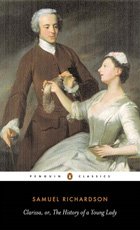In other news, I think I may have officially undervalued the Victorian novel, as the first text assigned in my new class on the Victorian novel proved wholly delightful, if not a bit inconsistent and way too long to be suitably read in the span of about two weeks. The work in question? Vanity Fair, by William Makepeace Thackeray, a sterling example of satire that never sacrifices its sense of adventure, romance, emotion, and epic scope despite poking wicked fun at every turn at the genre of which it is supposedly a part.
It throws everything about Victorian life -- and much of life in general, as well as the very idea and building blocks of fiction -- up to question: class structure, gender roles, the importance of money and (obviously) vanity to far too many people, literary genres, the role and reliability of the narrator in a novel. Complex w/r/t character (especially the indomitable Becky Sharp, who you love to hate and can never quite get a firm grasp on), story, intellectual intentions, and structure, it may have some inconsistencies with characters showing up and disappearing at random, but it's damn near a masterpiece. And since I'm woefully unfamiliar with a lot of Victorian fiction (except for maybe Dickens and certain adaptations of Sherlock Holmes), considering it, before (probably unfairly), as stodgy and lacking in a certain verve and electrifying sense of psychological depth and ontological contradiction that came later with Modernism and my man Samuel Beckett, it was all the more surprising. Rock on, Thackeray! And thank you, that class, for broadening my horizons.
Next time, I may just discuss Clarissa, the longest novel ever written in English and the main focus on my other class on narrative prose of the 18th century. Sounds intimidating but it's grabbing me pretty hard already, so huzzah!

Like this, but bigger and about a foot thick.
